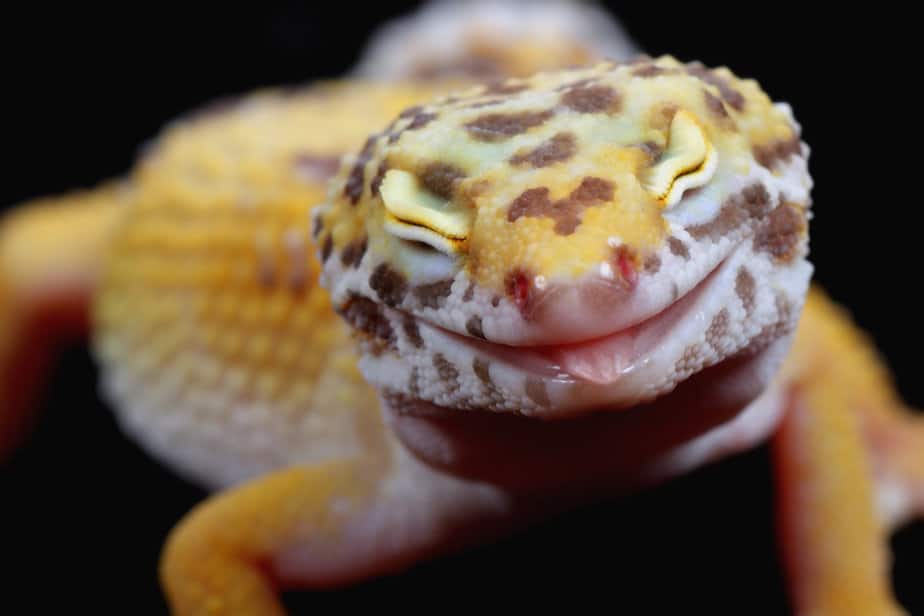The sleeping patterns of leopard geckos can be confusing for first-time owners. You might be wondering how long your leopard gecko sleeps. Fortunately, that’s what we’ll be going over in this post.
Leopard geckos sleep for around 12 hours and stay awake for the other 12. They usually sleep from dawn till dusk. If you notice that the sleeping pattern of your leopard gecko significantly deviates from this, there might be something wrong.

Why do leopard geckos sleep during the day?
Wild leopard geckos are usually exposed to high temperatures during the day in their native locations in the deserts of Afghanistan, Pakistan, and Iran.
Sometimes they even get higher than 104 degrees Fahrenheit. Such temperatures make it hard for leopard geckos to be active during the day. So instead, these reptiles choose to hide and sleep until the sun goes down.
It’s not surprising that captive leopard geckos also choose to sleep during the day. After all, pet owners usually design leopard gecko tanks to simulate their native environment.
Another thing to keep in mind is that it’s harder for leopard geckos to properly digest food and replenish their fat reservoirs in the heat of the day than at night. So you’ll notice that these reptiles usually eat when they’re most active at night.
What factors affect your leopard gecko’s sleeping patterns?
The main factors that affect your leopard gecko’s sleeping patterns are:
Diet
If you want your leopard gecko to sleep well, you need to provide them with a balanced diet. If you get things wrong, you can make your leopard gecko lethargic and fatigued, leading to long and erratic sleeping times.
The best foods to give your leopard gecko are crickets and mealworms. Ensure that all the insects you provide are smaller than the space between your leopard gecko’s eyes.
Also, remember to gut load the feeder insects and dust them with calcium and vitamin D3.
Ideally, you should feed your leopard gecko once a day or every other day. Offer larger portions if you choose to go with the latter, though.
Tank humidity
If the humidity of your leopard gecko’s tank is off, it won’t be able to sleep well. So always ensure the humidity is maintained at 30% to 40%.
Sometimes, simply placing a bowl of water in the tank is enough to maintain these humidity levels. If they go higher than this, you can fix the issue by opening the tank’s door and letting in some fresh air.
Lower humidity levels can be fixed by simply spraying a little water in the tank to raise them.
Tank temperatures
When temperatures in your leopard gecko’s tank are lower than they’re supposed to be, your reptile will start sleeping longer and can eventually enter brumation.
When temperatures are higher than necessary, your leopard gecko may refuse to come out of its hiding spot, even during the night. This will affect their activity levels, weight, and health.
Tank lighting
Ideally, your leopard gecko’s tank lighting system should be similar to the sun. It should be turned off at night – after 12 hours.
Also, it should emit some UVB rays if possible – this can help your leopard gecko better synthesize vitamin D3 and absorb calcium. In the long run, this can keep metabolic bone disease at bay.
Tank positioning
Placing your leopard gecko’s tank in a room that’s too bright or has a lot of traffic can affect their sleeping patterns. The former can make your leopard gecko refuse to get out of its hiding spot, even when it’s time to wake up.
Even leaving a TV on in your leopard gecko’s room is enough to overwhelm them when they’re trying to wake up at night.
On the other hand, placing your reptile’s tank in a room where your children and/or pets play a lot can make it difficult for them to go to sleep.
Nearby pets can make it scary for your leopard gecko to get out of hiding when it’s time to wake up. After all, your leopard gecko views pets as predators.
Tank setup
If your leopard gecko’s tank doesn’t have enough hiding spots, your reptile will struggle with sleeping.
Diseases
When leopard geckos are sick, they aren’t as energetic as they usually are. As such, they spend a lot of their time sleeping. After all, they need to reserve their energy so that it can be used to fight off the disease.
Why Does My Leopard Gecko Sleep So Much?
Leopard geckos sleep for 12 hours during daylight. This is completely normal. If they sleep for more than 12 hours per day, they may be sick or nutritionally deficient. Take them to a vet immediately to get a proper diagnosis.
Why Does My Leopard Gecko Sleep at Night?
Your leopard gecko may be sleeping at night if it doesn’t get enough sleep during the day. This could be caused by incorrect lighting or loud noises. Ensure there is not too much artificial lighting at night as leopard geckos will get confused and think it is daytime.
Final thoughts
For the most part, leopard geckos sleep for 12 hours. So as long as your leopard gecko doesn’t consistently deviate from this average or mostly sleeps at night, you have nothing to worry about!
